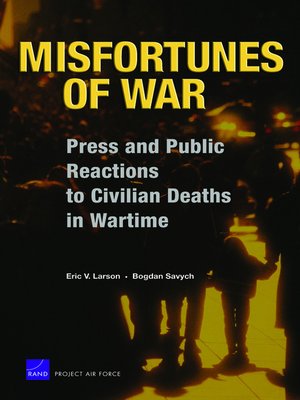Misfortunes of War
ebook ∣ Press and Public Reactions to Civilian Deaths in Wartime
By Eric V. Larson

Sign up to save your library
With an OverDrive account, you can save your favorite libraries for at-a-glance information about availability. Find out more about OverDrive accounts.
Find this title in Libby, the library reading app by OverDrive.



Search for a digital library with this title
Title found at these libraries:
| Library Name | Distance |
|---|---|
| Loading... |
This monograph, part of a larger study of ways to reduce collateral damage undertaken for the U.S. Air Force, analyzes media and public reactions to civilian casualty incidents, whether these incidents affect media reporting or public support for military operations, and, if so, how. It analyzes case studies of incidents of civilian deaths in the February 1991 bombing of the Al Firdos bunker in the Gulf War, the April and May 1999 attacks on the Djakovica convoy and Chinese embassy during the war in Kosovo, the June 2002 attack involving an Afghan wedding party during operations in Afghanistan, and the March 2003 incident involving a large explosion in a crowded Baghdad marketplace to describe and explain how the U.S. and foreign media and publics have responded. For each case study, the study team examined press, public, and leadership responses to these incidents and found the following. First, while avoiding civilian casualties is important to the American public, it has realistic expectations about the actual possibilities for avoiding casualties. Second, the press reports heavily on civilian casualty incidents. Third, adversaries understand the public's sensitivities to civilian deaths and have sought to exploit them. Fourth, during armed conflict, the belief that the United States and its allies are trying to avoid casualties most affects support for U.S. military operations, both at home and abroad. Fifth, while strong majorities of Americans typically give U.S. military and political leaders the benefit of the doubt when civilian casualty incidents occur, this does not necessarily extend to foreign audiences. Sixth, when civilian casualty incidents occur, it is at least as important to get the story right as to get the story out. Finally, attention to and concern about civilian casualties both at home and abroad have increased in recent years and may continue to do so.







